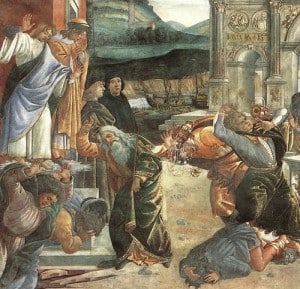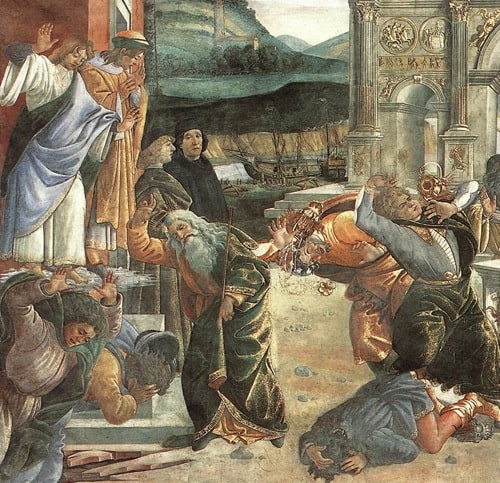Prayer is really about changing the one praying, not the external situation.
We read in Psalms:
Moshe and Aaron among His priests, and Samuel among those who call in His name, would call out to HaShem, and He would answer them (Psalm 99:6).
What was the essence of the power of these individuals that ensured that their prayers were answered? Why is Samuel connected the Moshe and Aaron in this verse?
 Moshe in the Torah portion of “Korach” and Samuel in our hafatara from the book of Samuel I (Samuel 1, 12) are faced with criticism from segments of the people. With Moshe the criticism is bold and direct and with Samuel it is subtle and yet clearly perceived as such by the prophet.
Moshe in the Torah portion of “Korach” and Samuel in our hafatara from the book of Samuel I (Samuel 1, 12) are faced with criticism from segments of the people. With Moshe the criticism is bold and direct and with Samuel it is subtle and yet clearly perceived as such by the prophet.
In both cases, though, the initial response is similar. In the book of Bamidbar (Numbers ) we read “ Moshe was exceedingly distressed, and he said to HaShem, “Do not accept their offering. I have not taken a donkey from a single one of them, and I have not harmed a single one of them.”( Numbers 16:15).
In the book of Samuel we read:
“Here I am; witness against me before HaShem and before His anointed: Whose ox have I taken? Or whose donkey have I taken? Or whom have I defrauded? Or whom have I oppressed? Or of whose hand have I taken a bribe to blind my eyes with? And I will restore it to you.” (Samuel 1, 12:3) .
When the people of Israel come to Samuel to beseech G-d to grant them a King , he is crestfallen.
“And they said to him, “Behold, you have grown old, and your sons do not walk in your ways. Now, set up for us a king to judge us like all the nations.” And the thing was displeasing in the eyes of Samuel, when they said, “Give us a king to judge us,” and Samuel prayed to HaShem (Samuel I 8:5-6). We see, similarly, when Moshe is confronted by Korach and his band of rebels that he too is crestfallen. ” Moshe heard and fell on his face.( Numbers 16:4.)
The sages ask the question as to why Moshe fell on his face instead of standing firm and even standing in prayer? The Midrash Rabba explains that “Moshe was thrown into a tremor… for this was already their fourth offense…. When Israel had sinned in connection with the Golden Calf, “Moshe besought G-d” (Exodus 32: 11).
When “the people were as murmurers” then “Moshe prayed” (Numbers 11:2). In connection with the Spies, “Moshe said unto G-d: ‘When Egypt shall hear…'” (ibid. 14:13). When the dissension of Korach broke out he said: How many times can I impose myself on G-d? So “When Moshe heard it, he fell upon his face.
The Baal Hatanya offers an enlightening perspective that offers insight not only unto Moshe’s actions but unto Samuel’s as well.
He writes “It would have been fitting for Moshe to answer him immediately, so why did he first fall on his face? Moshe, our teacher, had a feeling that maybe they were asking him this from On High, and Korach was only a messenger. Thus, he first fell on his face for self-reflection, to see if in truth he had any arrogance. After he thoroughly checked himself, and found no trace of pride, he understood that he [Korach] was not a messenger from On High, but was a divider [of people], and so he answered as he did.
Moshe as a leader, first looked into himself to determine what spiritual message was being conveyed to him. He wanted to understand what spiritual fixing was necessary in his own soul first.
We see the same thing with Samuel and his initial reaction. When Samuel turns to the people, he refers to G-d with unusual terminology ” And Samuel said to the people, “(It is) HaShem Who made Moshe and Aaron, and Who brought your forefathers up from the land of Egypt. ( Samuel I 12:6).
This is especially striking because Samuel was a descendant of Korach (I CHRONICLES 6:3-13).Korach was the same man who came against Moshe. The irony and the unique meeting of such Divine circumstances could not have escaped Samuel . That awareness almost impelled him to look first into himself as well.
That inward introspection is the key to true Divinely inspired leadership. A leader must sees himself or herself as an integral part of the people. He must see the mistakes of the people as indicative of a need for personal soul searching and scouring as well .
It is only such a leader who creates a situation wherein he “would call out to HaShem, and He would answer them.”
Prayer is about changing reality. Yet the basic ingredient that brings about such change is that prayer is really about changing the one praying. That is the purpose of Prayer. Everything flows out from that. May that be so of Israel’s present leadership as well.
